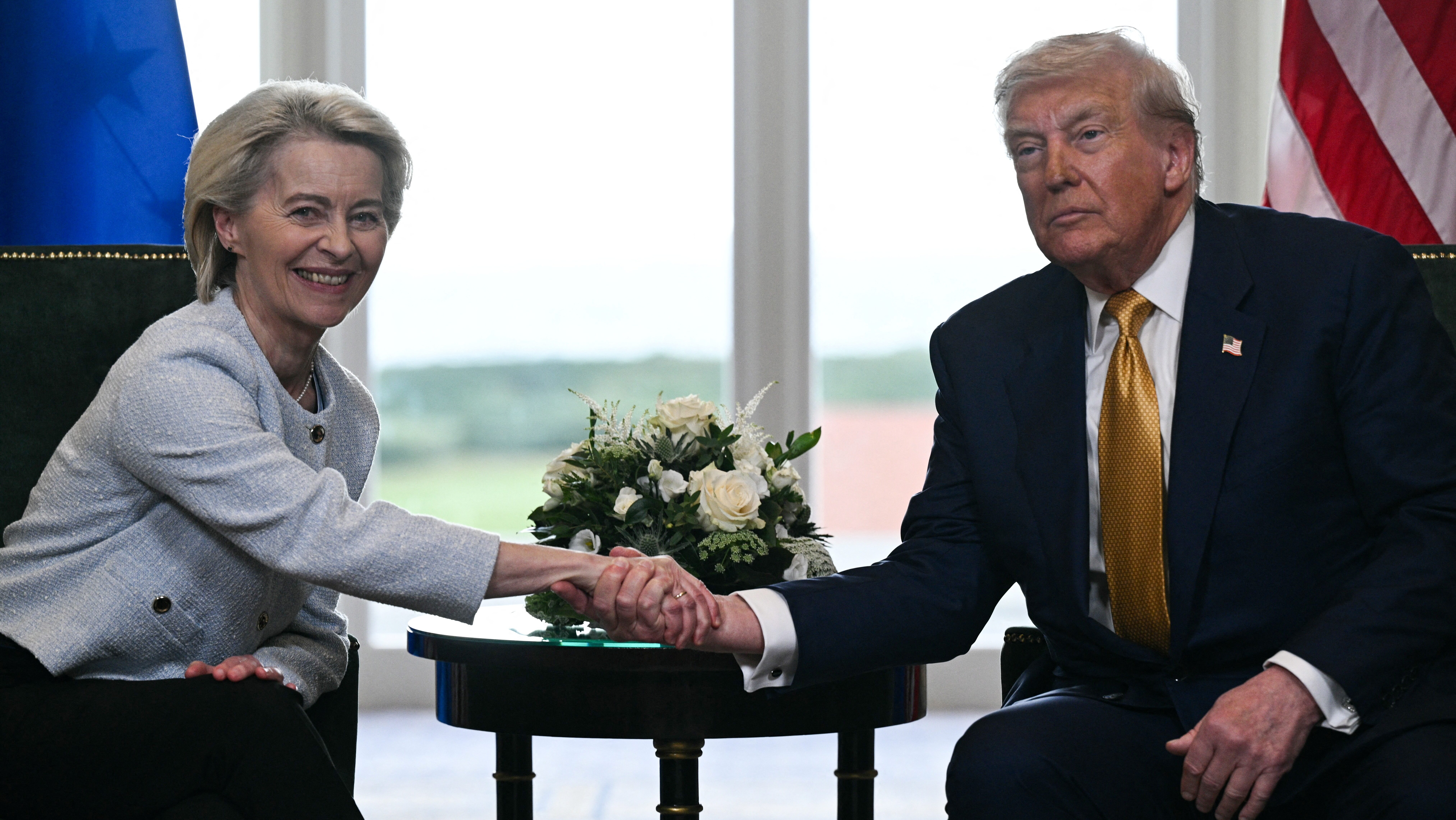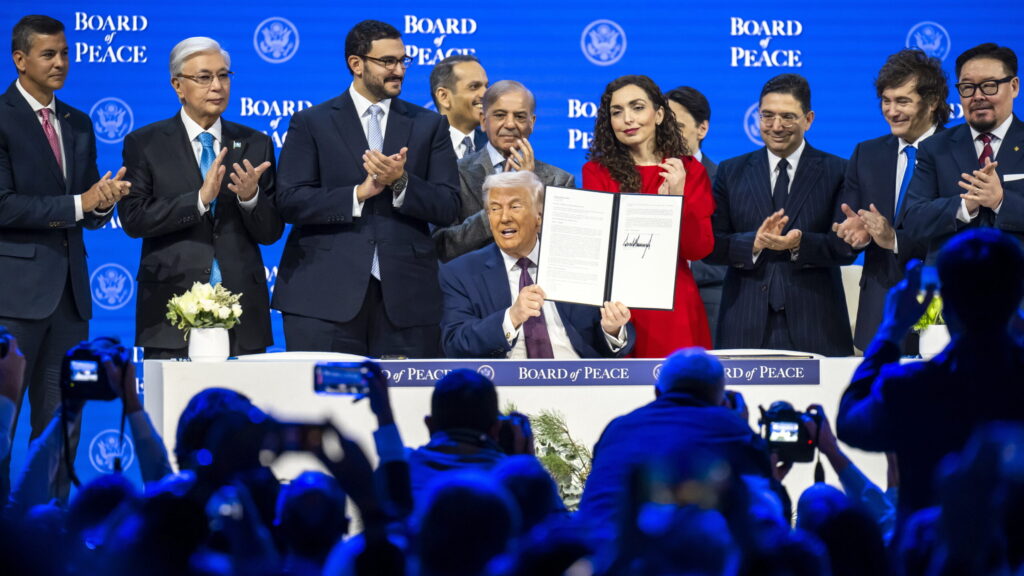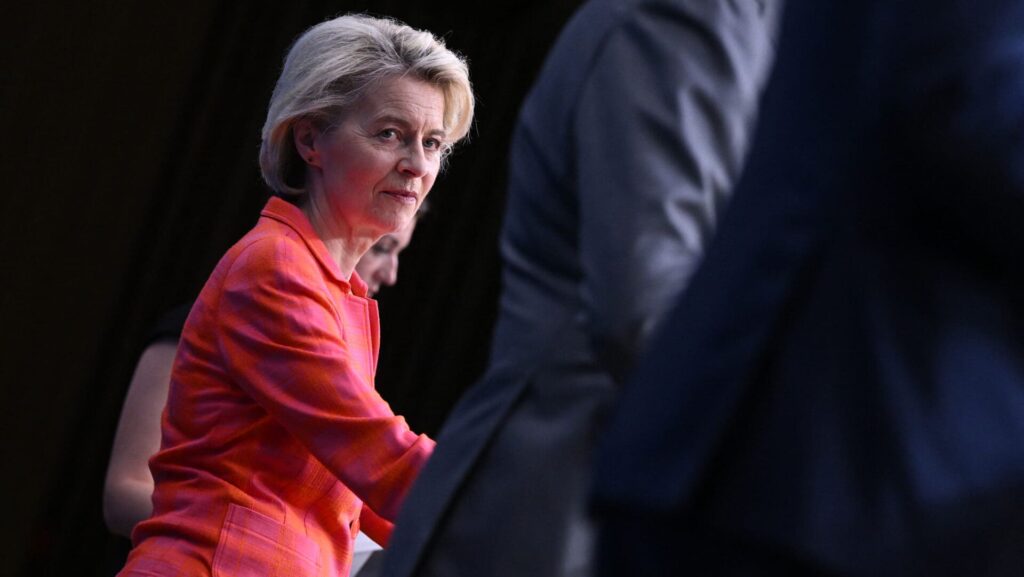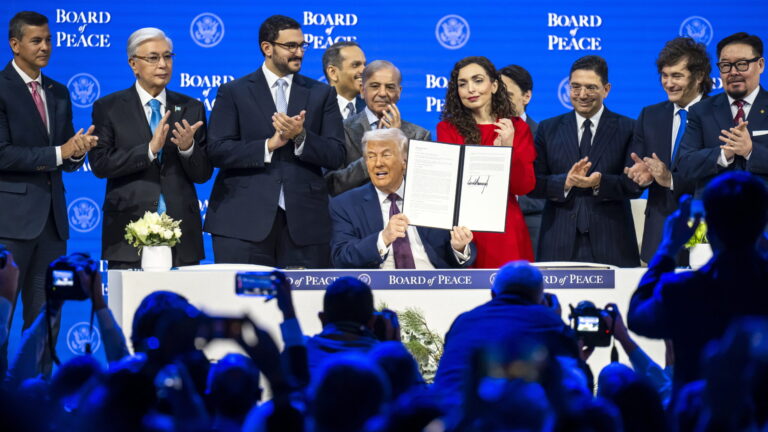Humiliation is probably the word most frequently used in recent days to describe the US–EU trade deal announced by European Commission President Ursula von der Leyen and US President Donald Trump on 27 July. ‘This morning, the embarrassment of Macron’s supporters and the deafening silence of Les Républicains speak volumes about the humiliation imposed by a Commission president whom they stubbornly supported. They promised us a powerful Europe, but what we have is a Europe of capitulation,’ wrote Jordan Bardella, President of the French National Rally (RN), on X the following morning. German economist Clemens Fuest also described the deal as a ‘humiliation’ and an EU defeat, as did Belgian expert Marc De Vos.
Jordan Bardella on X (formerly Twitter): “Ursula von der Leyen a accepté hier la reddition commerciale de l’Europe, au détriment de nos exportateurs, agriculteurs et industriels.Ce matin, la gêne des macronistes, le silence sidéral des LR, en disent long sur l’humiliation imposée par une présidente de la Commission… / X”
Ursula von der Leyen a accepté hier la reddition commerciale de l’Europe, au détriment de nos exportateurs, agriculteurs et industriels.Ce matin, la gêne des macronistes, le silence sidéral des LR, en disent long sur l’humiliation imposée par une présidente de la Commission…
The list could go on, and, to be frank, it is indeed difficult to find a more fitting word to describe the—fortunately still only a framework—agreement, which places the European Union in a multidimensional strategic overdependence on Washington, while receiving virtually nothing in return. As trade policy is an exclusive EU competence, von der Leyen’s Commission held the negotiating power throughout the months-long process, representing all 27 member states. Yet, as in so many previous cases, Brussels’s leadership has once again demonstrated its incompetence and weakness. However, it was not only their weakness that was laid bare—Europe’s was as well. Once a rich, innovative, thriving and much-admired continent, Europe is now a laughing stock on the global stage, forfeiting the last remnants of the prestige it had retained until now by bowing to the United States. ‘The lesson from this agreement: we are an economic giant, but politically irrelevant,’ observed Valérie Hayer, President of the Renew Europe group in the European Parliament, with unflinching accuracy.
Valérie Hayer on X (formerly Twitter): “The lesson from this agreement: we are an economic giant, but politically irrelevant.27 countries, 450 million consumers, the world’s second-largest economic power. An incredible force.And yet, starting this Friday, European goods exported to the United States will be hit… / X”
The lesson from this agreement: we are an economic giant, but politically irrelevant.27 countries, 450 million consumers, the world’s second-largest economic power. An incredible force.And yet, starting this Friday, European goods exported to the United States will be hit…
At a time of seismic shifts in the international world order, political relevance—or more precisely, political and diplomatic power—is indispensable. Real major powers instinctively detect its absence and, when they do, you cease to be an equal partner; you become, instead, a vulnerable satellite ripe for exploitation. ‘Today, the EU increasingly resembles 19th-century China: a still-rich empire that cannot be occupied by others, but is weak enough to be infiltrated and exploited,’ wrote founder of the Krytyka Polityczna movement Sławomir Sierakowski in 2019. Do you know what historians call the period of Chinese history between 1839 and 1949? The Century of Humiliation. Six years on from Sierakowski’s still-accurate situational analysis, one could argue that Europe’s own Century of Humiliation is now well underway. And this is not mere symbolism or rhetorical flourish: most of the components are already present, and they bear an unsettling resemblance to those that precipitated the fall of the Qing dynasty and the eventual rise of the Communist Party of China (CPC).
China’s Humiliation and Rebirth
Without delving too deeply into Chinese history, some introduction is needed to explain what the Century of Humiliation was, why it is so significant, and how it parallels the situation Europe currently faces. China’s century-long suffering began with the Opium Wars, fought between 1839–1842 and 1856–1860. During the first war, the British defeated the Qing dynasty’s forces, resulting in the Treaty of Nanjing, which ceded Hong Kong, opened ports, imposed reparations, and granted British extraterritoriality—marking the first of the infamous ‘unequal treaties’. The second war—also lost by Qing China—brought further treaties (the Treaty of Tientsin and the Convention of Peking), expanding foreign privileges, legalizing opium, and even leading to the looting of the Old Summer Palace. Until the end of the 19th century, a cascade of unequal treaties was imposed, mostly after military defeats or threats by Western powers. These treaties required obligations borne almost exclusively by the Chinese, including the cession of territory, payment of reparations, opening of treaty ports, relinquishment of control over tariffs and imports, and the granting of extraterritoriality to foreign citizens.
Then came the ‘Scramble for Concessions’ during the 1890s, when China was carved into foreign spheres of influence: Germany in Shandong, Russia in Manchuria, Britain in Weihaiwei and the New Territories, France in Guangzhouwan, and Japan in Taiwan and the Liaodong Peninsula. That was only checked by the United States, which advanced the Open Door Policy, granting all interested powers equal access to China to avoid the creation of colonies—though spheres of influence remained.
‘The Century of Humiliation has since become deeply embedded in Chinese national identity’
Internally, the Qing dynasty was deeply weakened by endemic corruption, bureaucratic mismanagement, and ineffective reform efforts. Movements such as the Self‑Strengthening Movement sought to modernize China’s military and industry but were sabotaged by elites and patronage networks, preventing meaningful institutional change. The dynasty’s armed forces remained technologically and organizationally backwards, while regional factions resisted central coordination, contributing to further military defeats such as those against Japan.
These systemic failures fueled widespread unrest, triggering massive uprisings. Disaffection peaked in the 1911 Xinhai Revolution, sparked by disaffected officers in the New Army, which ultimately overthrew the Qing dynasty and ended over two millennia of imperial rule. Finally, during the Second Sino–Japanese War (1937–1945), Japan’s invasion inflicted severe devastation and atrocities, culminating in the collapse of the old order and paving the way for the Communist rise and the birth of the sovereign People’s Republic of China.
The Century of Humiliation has since become deeply embedded in Chinese national identity, profoundly shaping the foreign policy of the Asian superpower. The factors behind China’s humiliation were clear: unequal treaties that stripped sovereignty, failed and corrupt leadership, military threats and defeats, territorial losses, and foreign occupation.
Europe’s (Self-)Humiliation
If we examine Europe’s current situation, almost all these factors are present—some literally, others metaphorically or symbolically. I identify the beginning of Europe’s Century of Humiliation in 2015, when EU elites willingly decided to open Europe’s borders to millions of migrants from completely different cultural and religious backgrounds. As I noted in an earlier opinion piece, Brussels viewed—and continues to view—mass migration as a bureaucratic and logistical issue rather than a civilizational challenge, and that is a grave strategic error. Migrants often enjoy more extensive social rights in Western societies than native citizens, even though many are unwilling or unable to integrate. This has resulted in the emergence of parallel societies across Europe. Muslim populations are rising at an intensive rate, and some Western capitals are rapidly becoming Islamic. We only need to look at the United Kingdom, France or Germany. The British government is advertising a ‘Sharia Law Administrator’ position in Manchester, while several French towns have introduced curfews for young people in response to escalating drug violence in migrant‑dense, economically marginalized suburbs. Meanwhile, Germany faces an increasing number of terrorist attacks year after year, almost exclusively involving migrants or migrant‑related perpetrators.
Public opinion is also clear about the threat. YouGov and Chatham House polls show overwhelming majorities in Germany (81 per cent), France (69 per cent), the UK (71 per cent), and Spain (80 per cent) believe immigration levels are too high in 2025. By taking over parts of Western cities—or even entire towns—outperforming Europeans in fertility rates and terrorizing native citizens, mass migration poses a serious risk of territorial loss for Europe in the future, albeit in a cultural and metaphorical sense.
Turning to unequal treaties, the European Union’s leadership has seemed almost eager to bind itself and its member states into unfavourable agreements in recent years. The most recent and most egregious example is the aforementioned US–EU deal. While the United States is imposing 15 per cent tariffs on around 70 per cent of EU exports to America, the EU is opening its markets to US goods, pledging to procure $750 billion of US energy products over the next three years, and committing to invest $600 billion in the US economy while promising to spend a ‘vast amount’ on US military equipment. Like China during the Qing dynasty, the EU is surrendering significant elements of its sovereignty—this time in the realms of energy, defence, and trade. The key difference is that, unlike Qing China, the EU has not been defeated militarily before capitulation. While the architects of the deal—Ursula von der Leyen and EU trade chief Maroš Šefčovič—hailed the agreement as a success, the overwhelming reactions—including those from the markets—say otherwise.
But this is far from the only unequal or lopsided agreement negotiated by Brussels in recent years. The EU–Mercosur Association Agreement, proposed in 2019, also faced heavy criticism from European farmers, labour unions, environmental NGOs, and indigenous groups. French and Irish lawmakers described the agreement as a ‘sell‑out’—favouring cheap agricultural imports in exchange for weakened EU environmental and climate standards. Although the EU stands to gain tariff reductions, critics viewed the concessions as strategically imbalanced, echoing colonial‑era trade asymmetries. Similar accusations surrounded the failed Transatlantic Trade and Investment Partnership (TTIP) negotiations, where critics focused on potential investor‑state dispute settlement clauses that would transfer decision‑making power to foreign arbitral tribunals. They warned of ‘modern‑day serfdom’, arguing that EU sovereignty would be eroded in favour of corporate arbitration—a capitulation to US corporate interests.
As strange as it may sound, the EU could also face a form of military defeat, though not in the conventional sense. As the war in Ukraine has dragged on for over three years, the EU’s leadership has increasingly defined Ukraine’s self‑defence as Europe’s own military conflict against Russia. ‘You are fighting not only for your freedom, your democracy and your future, but for ours too. You are fighting for Europe!’ von der Leyen declared before the Ukrainian parliament in November 2023. Moreover, the EU is proposing to allocate 20 per cent of the 2028–2034 budget to Ukraine—an unprecedented sum for any member state, let alone a membership candidate country. And the defence investment clause of the US–EU deal is also tied to Ukraine, as Šefčovič recently admitted.
Considering the billions of euros spent and pledged for Kyiv, as well as the rhetoric and framing used by EU leaders, it increasingly resembles more than a proxy war against Russia. Yet, as recent analyses suggest, the EU is losing. In its 2025 Annual Threat Assessment, US intelligence agencies warned that Russia has seized the upper hand, with Ukraine’s battlefield position eroding in a war of attrition. Moreover, Ukrainian analysts report that Russian drone operations now involve 500+ drones per night, with futures reaching 1,000, overwhelming Ukrainian defences. This drone barrage has signalled a tactical edge and is seen as evidence that Russia maintains battlefield momentum. While Trump has intensified his rhetoric against Vladimir Putin, cutting the earlier 50‑day deadline for secondary sanctions on Russian energy—which could significantly damage Moscow’s war economy—the outcome remains uncertain. For now, however, Ukraine’s defeat—and by extension Europe’s defeat—seems unavoidable.
It Should Not Last a Century
At the root of all this is an unelected, excessively bureaucratic, and deeply corrupt Brussels elite, which is exploiting every crisis to entrench its centralized power through various mechanisms—though, fortunately, not all have succeeded. Ursula von der Leyen’s Commission is facing mounting criticism for opacity and lack of transparency in many cases, including the so‑called ‘Pfizergate’. The Commission President only recently survived a no‑confidence vote in the European Parliament—the first in more than a decade. Brussels is increasingly starting to resemble the late Qing dynasty, desperately fighting for survival.
Europe’s humiliation, therefore, is well underway—yet it is up to us to ensure it does not last a century. And resistance, similar to that which contributed to the downfall of the Qing, is already emerging. Patriotic, right‑wing forces are gaining ground across Europe. The most striking example is the rapid rise of the Patriots for Europe (PfE) group, now the third‑largest in the European Parliament. It is becoming increasingly clear that the elite will not change without a revolution. However, the US–EU deal seems to be opening the eyes of even those who had blindly followed Brussels’s lead until now. Harsh criticism is no longer coming only from the right—it is being voiced by some of the most pro‑European actors across the political spectrum. This may well be the first sign of a broader rebellion against the EU’s failed leadership. It could also mark the first step out of humiliation.
Related articles:







